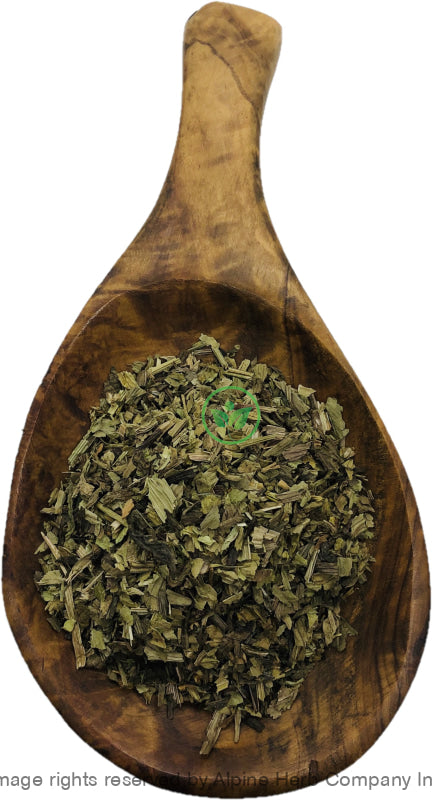Plantain Leaves Cut Alpine Herb Company Inc.
$ 10,49 $ 6,29
Botanical Name: Plantago major
Common Name:
- English: Broadleaf Plantain
- Ayurvedic: Ashvagola
- Also, known as: Phak Kaat Nam, Arnoglossa, Bag Yapragi, Baka Zhal By Rak, Bartang, Bazir Dam Bil, Breitwegerich, Broadleaf Plantain, Broad-Leaved Plantain, Piantaggine Grande, Piantaggine Maggiore, Buyuk Sinirliot, Büyük Sinir Out, Cart-Track Plant, Celtekas, Ceuli, Ceuli Uncal, Chajeoncho, Sinurotu, Snakeweed, Sobatshi Jazyk, Cuckoo’s Bread, Damarotu, Daum Sejumbok, Daun Sendok, Daun Urat, Door-Yard Plantain, Ekur Anjing, Ezan Lezu, Gechi Oulaghi, Englishman’s Foot, Tirnagt, Torongoat, Triputnik, Fi Lo, Fi Lomatolu, Grand Plantain, Grant Plantain, Great Plantain, Greater Plantain, Grosser Wegerich, Grote Weegbree, Healing-Blade, Henplant, Jghakhot, Katir, Katta Zubturum, Otot Ototan, Pătlagină, Piharatamo, Sangka Buwah, Sangkubah, Sangkuwah, Sei Ohr Re, Kesirotu, Ki Urat, Kuping Menjangan, Lahuriya, Lanting, Lanting Haba, Lamb’s-Foot, Laukahi, Lielā Ceļmalīe, Ch’e Ch’ien, Che Qian Zi, Common Plantain, Lisan Al-Hamal, Llantén, Llantén Común, Llanten Mayor, Llanten, Meloh Kiloh, Mo Noi, Nipple Grass, Phak Kat Nam, Plantain, Plantain Commun, Plantain Majeur, Plantate Gros, Podorozhnik Bolshoi, Poputnik, Pridorozhnik, Priputnik, Putiki, Putnik, Ratamo, Rat’s tail, Ribgrass, Ribble Grass, Ripple Grass, Sembung Otot, Suri Pandak, Suur Teeleht, Tanagem, Tanchagem-Maior, Tarkuz, Tsirevaja Trava, Twissat Mariam, Wayboard, Waybread, Wegerich, Wegerlich, White-Man’s Foot, Piantaggine, snakeweed, broad-leafed plantain,
Habitat: Asia and Europe
Origin: Poland
Harvested: Wild or cultivated
Parts Used: Leaves
General Information:
Plantago major, is an herbaceous perennial plant that forms a rosette of dark green leaves that lie close to the ground. The blades of the basal leaves are 2-4-inch-long and 1.5-3 inches across; they are oval in shape with about 5 parallel veins and smooth margins. The upper surface of each blade is medium green and glabrous to sparsely canescent, while the lower surface of each blade is light green and sometimes finely pubescent along the veins. Stem leaves lacking. Inflorescence of dense, narrow, bracteate spikes. Spikes less than 1 cm thick, 5-25 cm long, green-brown, smooth. Flowers hermaphrodite, anemophilous and/or autogenous. Peduncle glabrous. The lower one-third of each stalk is Floral Spikes green, terete, glabrous to finely pubescent, and naked; a narrowly cylindrical spike of greenish flowers occurs along the upper two-thirds of each stalk. These small flowers are densely distributed along with the spike. Each flower is only 3 mm long, consisting of 4 green sepals, a pistil with a single white style, 4 stamens with pale purple anthers, and a papery corolla with 4 spreading lobes. The flowers are wind-pollinated. The flowers are replaced by ovoid seed capsules that are individually about 3 mm. long at maturity; they are initially green, but later become purple or brown. Each seed capsule is circumsessile and splits open around the middle to release the seeds. Each capsule contains about 10-15 seeds. The seeds are 1-2 mm. long, light to dark brown, and somewhat flattened; the seed surface is finely reticulated, requires 10x hand lens to see. The root system consists of a short crown with fibrous roots.
How to use:
Hot Infusion:
The basic method for dried herbs and flower is, take 2-3 tablespoons of dried herb in a cup or teapot. Pour hot water over it and cover it with lid for 10-30 minutes. Hot water is needed to draw out the antioxidants, enzymes, vitamins, flavonoids, and volatile oils from the botanicals. Strain and squeeze out as much as liquid as possible and enjoy!
Tips:
- You can sweeten your herbal tea with a bit of honey, natural fruit juice, stevia leaves powder and or licorice root powder.
- You can make ice cubes or pops by freezing tea in ice trays or pop molds.
Precautions:
You should consult with a qualified healthcare practitioner before using any herbal products, particularly if you are pregnant, nursing, or on any medications.
All information on this website is for educational purposes ONLY.
This information has not been evaluated by Health Canada.
This information is not intended to diagnose, treat, cure, or prevent any disease.
| Unit Size | 100g, 200g, 400g, 1kg |
|---|
Prompt shipping and expert packing
Thanks to our longstanding association with UPS FedEx DHL as well as other leading global carriers, we can offer a variety shipping options. Our warehouse staff is highly trained and will be able to pack your goods in accordance with our precise and exact specifications. Your items will go through an exhaustive examination before they will be securely packaged before being delivered. We ship to hundreds of thousands of customers daily in different countries. This is a sign of our determination to become the largest online retailer worldwide. Warehouses and distribution centers are located throughout Europe as well as in the USA.
Note that orders containing multiple items are processed according to the particular item.
We will thoroughly inspect all items ordered before shipping. Most orders are shipped within 48 hours. The delivery time will be between 3 and 7 working days.
Returns
The stock market is always changing. It's not entirely managed by us since we're involved with several entities, including the factory and the storage. Therefore, the actual inventory could fluctuate at any moment. Please be aware that it is possible that your order could be out of stock after you've placed your order.
Our policy lasts for 30 days. If it's been more than 30 days since the date you purchased your item We're sorry to say that we can't offer you a full exchange or refund.
You can only return a product if it is unused and still in the same state as when you received it. The item should be in the original packaging.


































